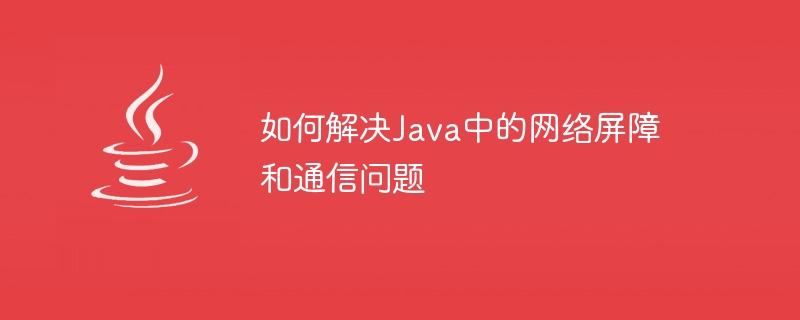

Java でのネットワーク障壁と通信の問題を解決する方法
Java 開発では、ネットワーク障壁と通信の問題が一般的な課題です。ネットワーク通信中に、接続障害やデータ通信の遅延、通信異常などが発生する場合があります。これらの問題を解決するには、いくつかの方法とテクノロジーを使用して、ネットワーク通信のパフォーマンスと安定性を最適化できます。この記事では、いくつかの一般的な解決策について説明し、対応するコード例を示します。
Java では、マルチスレッドを使用してネットワーク通信を処理し、通信効率と同時実行性を向上させることができます。各ネットワーク要求または接続を独立したスレッドとして処理することにより、メインスレッドのブロックを回避し、システムの同時処理能力を向上させることができます。
次は、マルチスレッドを使用してネットワーク通信を処理する方法を示す簡単な例です。
import java.io.*;
import java.net.*;
public class NetworkThread extends Thread {
private Socket socket;
public NetworkThread(Socket socket) {
this.socket = socket;
}
public void run() {
try {
// 处理网络通信逻辑
// ...
} catch (IOException e) {
// 处理异常
e.printStackTrace();
} finally {
// 关闭socket连接
try {
socket.close();
} catch (IOException e) {
e.printStackTrace();
}
}
}
}
public class Server {
public static void main(String[] args) throws IOException {
ServerSocket serverSocket = new ServerSocket(8080);
while (true) {
Socket socket = serverSocket.accept();
NetworkThread networkThread = new NetworkThread(socket);
networkThread.start();
}
}
}import java.io.*;
import java.net.*;
import java.nio.*;
import java.nio.channels.*;
public class Server {
public static void main(String[] args) throws IOException {
ServerSocketChannel serverSocketChannel = ServerSocketChannel.open();
serverSocketChannel.bind(new InetSocketAddress(8080));
serverSocketChannel.configureBlocking(false);
Selector selector = Selector.open();
serverSocketChannel.register(selector, SelectionKey.OP_ACCEPT);
while (true) {
selector.select();
for (SelectionKey selectionKey : selector.selectedKeys()) {
if (selectionKey.isAcceptable()) {
SocketChannel socketChannel = serverSocketChannel.accept();
socketChannel.configureBlocking(false);
socketChannel.register(selector, SelectionKey.OP_READ);
} else if (selectionKey.isReadable()) {
SocketChannel socketChannel = (SocketChannel) selectionKey.channel();
ByteBuffer buffer = ByteBuffer.allocate(1024);
int bytesRead = socketChannel.read(buffer);
if (bytesRead > 0) {
// 处理读取的数据
buffer.flip();
byte[] bytes = new byte[buffer.remaining()];
buffer.get(bytes);
System.out.println("Received: " + new String(bytes));
buffer.clear();
} else if (bytesRead == -1) {
socketChannel.close();
}
}
}
selector.selectedKeys().clear();
}
}
}import java.util.concurrent.*;
public class Producer implements Runnable {
private BlockingQueue<String> queue;
public Producer(BlockingQueue<String> queue) {
this.queue = queue;
}
public void run() {
try {
// 模拟网络通信
Thread.sleep(1000);
String message = "Hello World!";
queue.put(message);
} catch (InterruptedException e) {
e.printStackTrace();
}
}
}
public class Consumer implements Runnable {
private BlockingQueue<String> queue;
public Consumer(BlockingQueue<String> queue) {
this.queue = queue;
}
public void run() {
try {
String message = queue.take();
// 处理接收到的消息
System.out.println("Received: " + message);
} catch (InterruptedException e) {
e.printStackTrace();
}
}
}
public class Main {
public static void main(String[] args) {
BlockingQueue<String> queue = new ArrayBlockingQueue<>(10);
Thread producerThread = new Thread(new Producer(queue));
Thread consumerThread = new Thread(new Consumer(queue));
producerThread.start();
consumerThread.start();
}
}以上がJava でネットワーク障壁と通信の問題を解決する方法の詳細内容です。詳細については、PHP 中国語 Web サイトの他の関連記事を参照してください。